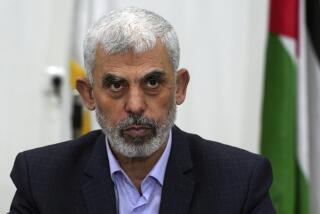Abbas Seeks Cabinet Post for Hamas
- Share via
JERUSALEM — Palestinian Authority President Mahmoud Abbas has made overtures to the Islamic militant group Hamas about joining his Cabinet in the near future, Palestinian officials said Friday.
Hamas has not yet said whether it is willing to accept such an invitation. However, in recent months the group has made clear its interest in mainstream electoral politics, and it intends to field candidates in parliamentary balloting this year.
That election, originally set for mid-July, is now expected sometime after Israel’s withdrawal from the Gaza Strip, which is scheduled to begin in mid-August.
The idea of approaching Hamas to participate in the government prior to the voting has been raised in several recent meetings of Abbas’ Fatah faction, Palestinian officials said, including talks currently underway in Amman, Jordan.
Fatah’s Central Committee, which sets the movement’s policy, is meeting in the Jordanian capital to accommodate exiled leaders such as Farouk Kaddoumi, a Palestine Liberation Organization hard-liner who refuses to enter the Palestinian territories because he would have to submit to Israeli border formalities.
“The spirit of this meeting involves participation of all Palestinian factions in a national unity government,” said Nabil Shaath, a Palestinian deputy prime minister and the minister of information.
In Gaza, Hamas spokesman Sami abu Zuhri said the militant group would announce its position on joining the government “at a suitable time.”
Palestinian and Israeli media reports said that Hamas had previously demanded that Abbas set up a special authority to oversee the hand-over of Gaza that would include the militant group but that the Palestinian leader had refused. Israeli plans call for evacuating all 21 Jewish settlements in Gaza and four smaller ones in the northern West Bank.
At the Amman talks, Fatah officials reportedly are also weighing candidates, including Kaddoumi, for deputy to Abbas. The Palestinian president endorsed the idea of having a deputy after undergoing a coronary procedure last month in the Jordanian capital.
Hamas, which has scored strongly in municipal elections in the West Bank and Gaza, is expected to do well in parliamentary balloting. Last week, respected Palestinian pollster Khalil Shikaki told reporters that the latest numbers indicated the group could easily win a third of the seats on the Palestinian Legislative Council.
Both Hamas and Fatah officials in the Gaza Strip said Hamas might be willing to accept a Cabinet position or positions before the pullout to help ensure that the hand-over of Gaza, where the group has great influence, goes smoothly.
Hamas has a large and loyal following in Gaza, particularly among the seaside enclave’s poorer residents. The group’s popularity stems largely from the social services it provides and from its image of incorruptibility, which contrasts sharply with the graft-ridden history of the Palestinian Authority.
Israel and the Palestinian Authority have been locked in dispute about how Abbas ought to deal with Hamas. The group’s military wing carried out dozens of suicide bombings during more than four years of fighting, and it has never abandoned an ideology that calls for the destruction of Israel.
Until now, Hamas has declined to take part in the Palestinian government, citing objections in principle to the interim peace accords that brought the Palestinian Authority into being more than a decade ago.
Hamas, together with other armed factions, agreed in March to observe a period of calm until the end of the year, refraining from attacks against Israelis. Its militants have violated that informal accord by firing mortar shells and rockets at Jewish settlements and Israeli communities, but only Islamic Jihad has mounted major attacks during the ad hoc truce.
On the Israeli side, polls Friday suggested that Prime Minister Ariel Sharon was again rallying public support for his Gaza pullout plan. Previous surveys had shown backing for the withdrawal slipping below 50%.
However, this week’s violent actions by extremists opposed to the pullout, including a widely publicized incident in which settler youths beat a Palestinian in front of news photographers, apparently have swayed opinion against the settlers.
A survey published in Friday’s editions of the daily newspaper Yediot Aharonot indicated that support for Sharon’s plan had climbed to 62%.
A poll in the Maariv newspaper said 54% backed the withdrawal.
Special correspondent Fayed abu Shammalah in Gaza City contributed to this report.
More to Read
Sign up for Essential California
The most important California stories and recommendations in your inbox every morning.
You may occasionally receive promotional content from the Los Angeles Times.










